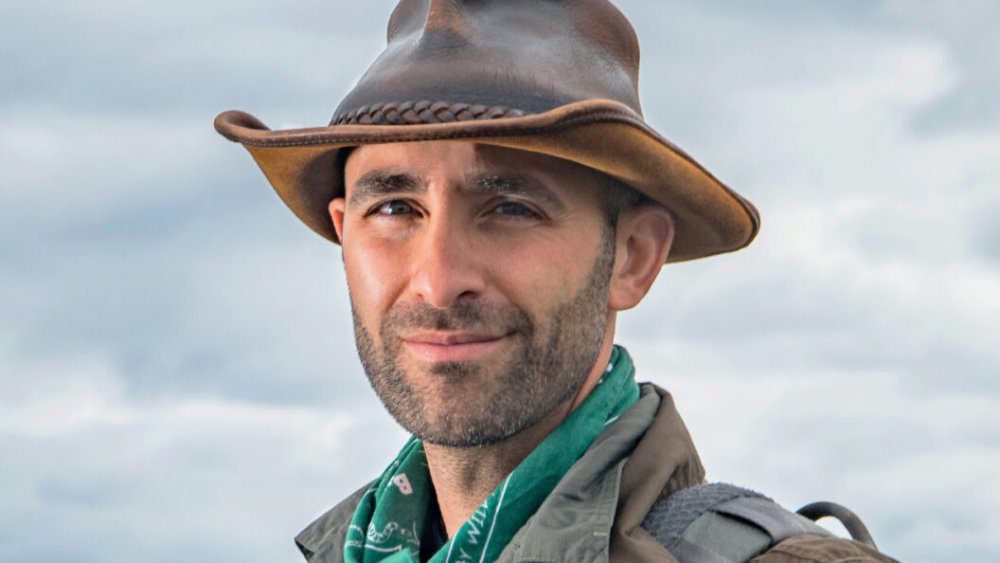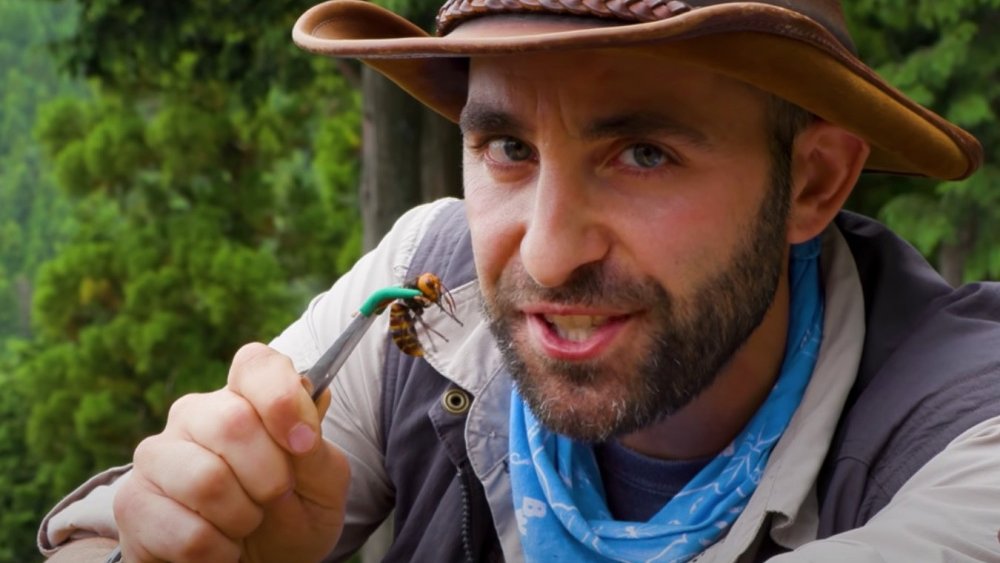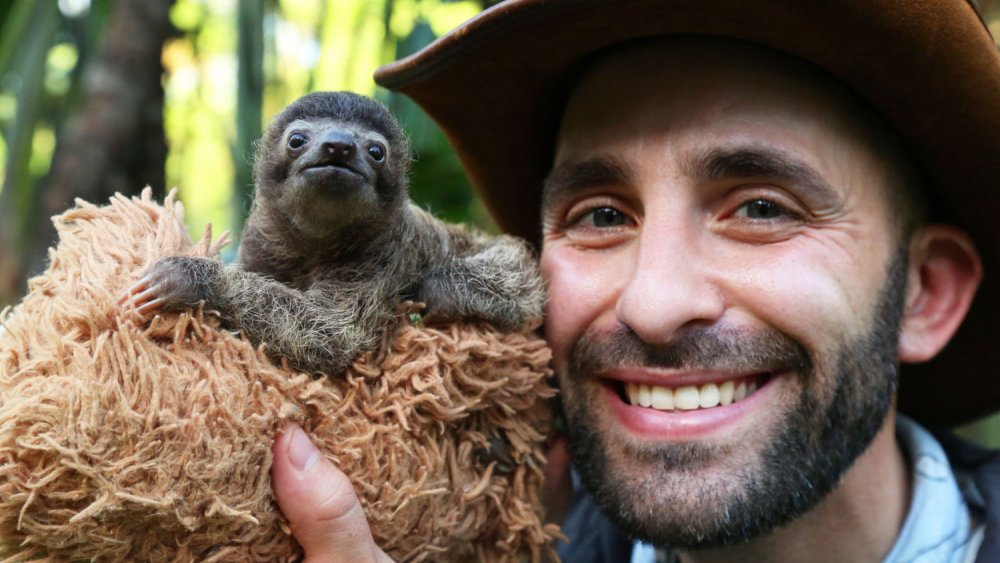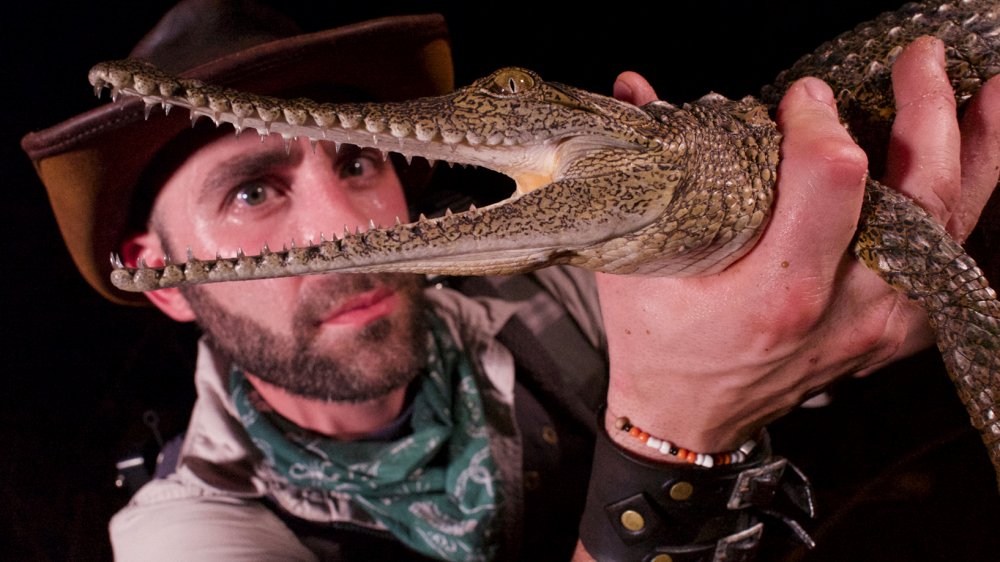Coyote Peterson Dishes On His Virtual Summer Camp With Varsity Tutors - Exclusive Interview
Chances are pretty good that your summer 2020 plans have been disrupted. Vacations have been canceled. Summer camps and national parks are closed. For kids and adults who were planning on spending the summer outside, that poses a problem: What are you supposed to do with all of your spare time?
Well, never fear. Coyote Peterson, founder of the Brave Wilderness YouTube channel and host of Animal Planet's Brave the Wild, is here to help.
Peterson, who made his name getting stung and bitten by all kinds of interesting creatures in the name of education, has teamed with the website Varsity Tutors to hold a series of free, live "virtual summer camp" classes called YEEOOW!: The Science of Bites and Stings. The first session, "The Science of Animal Stings," can be found on Varsity Tutors' YouTube page. The second, which is all about animal bites, begins at 3:30 PM ET on Tuesday, June 30.
Peterson has always maintained that the dangerous situations he puts himself into on his YouTube channel are about educating the audience as much as entertaining them, and after just a few minutes of his virtual summer camp, it's clear that the self-taught conservationist is a natural teacher.
In advance of Tuesday's session, Looper spent a few minutes talking with Peterson about what his fans can expect from the online camp, how the COVID-19 pandemic is affecting Brave Wilderness, and a few other surprises that Peterson has in store. Here's what he had to say.
What makes Coyote Peterson's YEEOOW!: The Science of Bites and Stings class unique
So, how did you get involved with Varsity Tutors' virtual summer camps?
Obviously, in the day and age where the coronavirus is limiting people from being at school or spending time in their summer camps, whatever those limitations might be, everybody's looking for some sort of entertainment — and, in many cases, a little bit of extra education. Varsity Tutors approached my management team in California and said, "Hey, we know Coyote has a pretty large fan base," and they asked if I'd be interested in participating in their summer camp series by hosting a couple of free live events done through Zoom, and I said, "Yeah, absolutely." I mean, I didn't really have to think twice about participating in it.
We've been hosting a little live stream series on our YouTube channel called "Ask a Biologist," which actually launched during quarantine. The "Ask a Biologist" thing is relatively similar to what I'm doing with Varsity Tutors. Varsity Tutors is a little more honed in on a specific subject matter, but because I'd already been doing these live streams day after day after day, it just made sense to fit it into my natural schedule. And it's for such a good cause. I was like, "Yeah, let's do it."
What can viewers get from this class that they don't get from your YouTube channel or your TV show, Brave the Wild?
The two classes that we created center around, obviously, some of our most popular content: the concept of me being intentionally bitten or stung by things to show you the effects of these venoms or the power of these bites on the human body. Obviously, we use that as a lure to get people interested in the class.
To hear me talk about these scenarios behind the scenes, it's a little different than the experience you get from just watching on YouTube. One of the things that I do is share stories of how certain episodes came to fruition, or why we did things the way that we did, or why we picked certain species to focus on — if it was related to the stings or related to the bite. So, I guess it's a little inside baseball when it comes to some of the concepts we've created.
But the real core of it is still getting an education about these animals, many of which people are afraid of. Especially nowadays, when we're getting into the summer months and people are heading outside more, they stand a better chance of encountering some of these animal species in the wild.
You've said in the past that you've retired from stings and bites in order to focus on other things. Given that, why focus on those two elements of your channel for the class?
Well, there's a certain popularity on our channel, regardless if I'm currently taking any intentional bites or stings. I mean, those videos still seem to crank out millions and millions of views every month, which is crazy. More often than not, people will be like, "Hey, aren't you that guy that got stung by that bullet ant?" rather than necessarily know that my name is Coyote Peterson.
When it comes to stings, there's not really many other intentional stings I could take. And the way that we ended that climb up the insect sting pain index was a perfect scenario. I've accomplished it, there's no reason to try to revisit what it is.
When it comes to bite content, though, we do have some more content in that realm that's coming out. I actually have a new book coming out this fall called The Beast of Bites that focuses on a number of the different bites that I've done. I just got finished filming an episode all about giant catfish, where in order to catch the catfish, I had to be bitten by the animal to actually get it out of its hole. The bites that I'm sustaining through some of these videos aren't necessarily as extreme as some of the stuff you saw before, but there's still an allure to finding out what is the impact that moment has is.
We're actually launching a new series within the YouTube realm called Eaten Alive, where we do some experiments with different species to find out if they will or if they will not bite humans. I don't want to give away any spoilers, but I'm pretty sure the audience is going to be pleasantly surprised when they see the content coming out.
How the ongoing pandemic is affecting Brave Wilderness, and how you can enjoy nature in the era of COVID-19
In the first session of your class, you said that the COVID-19 situation has made filming for TV quite difficult. How is the pandemic affecting your YouTube production?
On the YouTube side, it has actually been quite a bit easier. Our travel this year has definitely been limited. We're only traveling within and around the United States this year, and only went on our first production trip of the year a few weeks ago, when some of these restrictions were lifted for quarantine.
When my team and I travel, we try our best to do it by way of vehicle, and because of the areas that we're filming in, we're really not around people at all. We stay in Airbnbs. We make all of our own food. So, we are trying to follow the social distancing rules and regulations as closely as possible.
We won't be doing any production for any television content within the span of 2020, but with YouTube, the episodes can be shorter, and episodes can be about subject matter that isn't as impactful as an episode of television. And we're managing to survive — and, I'm actually excited to say, thriving to exceptional levels. We've set records these past two months on the YouTube channel for number of people that have been watching, and subscriber numbers continue to build, which is great.
We certainly feel fortunate in that people are stuck at home right now and they're watching a lot of YouTube, and we're just very thankful to be on that end of being able to provide them with the entertainment and education that they're getting from Brave Wilderness.
Obviously, there are your classes, and Varsity Tutors offers a number of other virtual summer camp classes, but other than those, do you have any recommendations for what kids can do experience nature during the pandemic?
Yeah, absolutely. I mean, the whole concept of being stuck inside is relative based on where you live. So, if you're stuck in downtown Manhattan, obviously your ability to get out and explore is going to be greatly limited, which means that having the reach of technology and the internet and YouTube is a wonderful thing. But for any kids who live in more rural areas, if your family's comfortable with you being outside in your own backyard and some of our local metro and state parks, as long as you're practicing safe social distancing, you should be fine heading out this summer to explore.
I know a number of our different state and national parks are still shut down in certain areas, but at least here — and I'm speaking mostly on behalf of Ohio — all of our metro parks and stuff like that are open, and they stayed open during quarantine, which really encourages people to get outside and take a walk in nature. So, for kids this summer, certainly if you want to expand your education beyond the internet or beyond the books you can read, getting out to explore on your own — whether it's in the backyard or one of your local parks — you should be in it to make it there safely.
What you can expect from Coyote Peterson's next summer camp class
Can you tease anything about next week's class?
Next week's class is the brutal truth behind some of the bites that I've taken. And what's great about that is I really like the diversity of the species. The one thing that pigeonholes a little with the stings is that they're all insects. These bites range from mammals to reptiles to sea creatures. There's a wide gambit of animal species to talk about. And I'm certainly going to be revealing some of the little hints of the stuff that we have in development right now that will be coming out later this year, with some of the work we're doing specifically to visit this idea of being "eaten alive" by certain animal species. So, I think the audience is going to be excited to hear that Coyote is coming out of bite retirement, so to speak.
How did you decide which animals to feature in the bite class?
It was pretty easy. I kind of just broke it down on what would be the most diverse, what had the biggest impact, and how I differentiate between the idea of an intentional bite and an unintentional bite — because those are two very separate things.
A lot of people ask, "Are you ever going to get bitten by a venomous snake?" And the answer to that is, "Certainly not." But I've been bitten by other snakes, inadvertently, that weren't venomous, on accident, as compared to some of the intentional ones I've taken from things like snapping turtles and giant desert centipede.
So, it was a matter of making it diverse, giving it the edge of creepiness, and also working in some species that they may actually encounter, because then that serves for a good educational slant: what to do if you see one of these animals in the wild, how to approach or interact with it, and if you're going to interact, how to be safe to ensure that you and the animal are not injured and that everybody has a happy summer.
Is there anything else want to share about the class?
I guess I'll close by saying that getting the chance to work with Varsity Tutors has been fantastic. I mean, their entire team is about as professional as it gets. From their tech side to their graphic design side, the whole process has been fantastic. You never know what you're going to get into when you team up with somebody working with them for the first time.
Obviously, the entire message they're trying to get across is about bringing education to kids — whether that's about animals or a number of other different subject matters that fall within the Varsity Tutors realm. I'm very excited to be partnered with them. We've got some big plans for other projects into the future.
The first episode of YEEOOW!: The Science of Bites and Stings, "The Science of Animal Stings," is available to watch now on Varsity Tutors' YouTube page right now. Tune into the next episode on Tuesday, June 30 at 3:30 PM ET.



